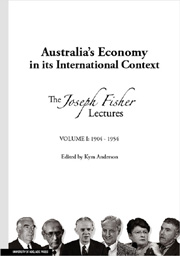Book contents
- Frontmatter
- Contents
- Preface
- List of lectures in volume 2 (1956-2009)
- Contributors to opening chapters
- The benefactor Joseph Fisher
- The lectures
- The lecturers
- 1 1904 – Commercial education
- 2 1906 – Commercial character
- 3 1908 – The influence of commerce on civilization
- 4 1910 – Banking as a factor in the development of trade and commerce
- 5 1912 – Australian company law, and some sidelights on modern commerce
- 6 1914 – Problems of transportation, and their relation to Australian trade and commerce
- 7 1917 – War finance: Loans, paper money and taxation
- 8 1919 – The humanizing of commerce and industry
- 9 1921 – Currency and prices in Australia
- 10 1923 – Money, credit and exchange
- 11 1925 – The Guilds
- 12 1927 – The financial and economic position of Australia
- 13 1929 – Public finance in relation to commerce
- 14 1930 – Current problems in international finance
- 15 1932 – Australia's share in international recovery
- 16 1934 – Gold standard or goods standard
- 17 1936 – Some economic effects of the Australian tariff
- 18 1938 – Australian economic progress against a world background
- 19 1940 – Economic coordination
- 20 1942 – The Australian economy during War
- 21 1942 – Problems of a high employment economy
- 22 1946 – Necessary principles for satisfactory agricultural development in Australia
- 23 1948 – The importance of the iron and steel industry
- 24 1950 – The economic consequences of scientific research
- 25 1952 – Australian agricultural policy
- 26 1954 – The economics of Federal-State finance
13 - 1929 – Public finance in relation to commerce
Published online by Cambridge University Press: 05 June 2012
- Frontmatter
- Contents
- Preface
- List of lectures in volume 2 (1956-2009)
- Contributors to opening chapters
- The benefactor Joseph Fisher
- The lectures
- The lecturers
- 1 1904 – Commercial education
- 2 1906 – Commercial character
- 3 1908 – The influence of commerce on civilization
- 4 1910 – Banking as a factor in the development of trade and commerce
- 5 1912 – Australian company law, and some sidelights on modern commerce
- 6 1914 – Problems of transportation, and their relation to Australian trade and commerce
- 7 1917 – War finance: Loans, paper money and taxation
- 8 1919 – The humanizing of commerce and industry
- 9 1921 – Currency and prices in Australia
- 10 1923 – Money, credit and exchange
- 11 1925 – The Guilds
- 12 1927 – The financial and economic position of Australia
- 13 1929 – Public finance in relation to commerce
- 14 1930 – Current problems in international finance
- 15 1932 – Australia's share in international recovery
- 16 1934 – Gold standard or goods standard
- 17 1936 – Some economic effects of the Australian tariff
- 18 1938 – Australian economic progress against a world background
- 19 1940 – Economic coordination
- 20 1942 – The Australian economy during War
- 21 1942 – Problems of a high employment economy
- 22 1946 – Necessary principles for satisfactory agricultural development in Australia
- 23 1948 – The importance of the iron and steel industry
- 24 1950 – The economic consequences of scientific research
- 25 1952 – Australian agricultural policy
- 26 1954 – The economics of Federal-State finance
Summary
The title of my lecture this evening is: “Public Finance in Relation to Commerce.” This covers a wide range of topics, and is capable of treatment from many points of view, for the operations of public finance are manifold, and the manifestations of commerce are various. I shall be unable to do more than select for discussion certain aspects. In the Commonwealth, and in most of the States, acute problems of public finance now confront us, but I do not intend to attempt any original analysis of the financial situation in Australia, still less to propound any startling solution. I shall rather attempt to discuss the nature and meaning of the operations of public finance and the economic effects of the system as a whole and in its various parts. These latter aspects are less exciting and controversial than the former, but they concern matters which are too often lost sight of in public discussion of the former aspects, to which discussion they are, indeed, an essential preliminary.
Public finance
The State is a form of social organization to which every man must belong, and it is usually recognised that the chief activity of the State is government, which includes both legislation and administration.
In order that the State may fulfil its purposes, in order that it may be enabled to exercise its functions, it must have money to expend, and it raises this in the form of annual revenue, or at times, by borrowing.
- Type
- Chapter
- Information
- Australia's Economy in its International ContextThe Joseph Fisher Lectures, pp. 323 - 348Publisher: The University of Adelaide PressPrint publication year: 2009



